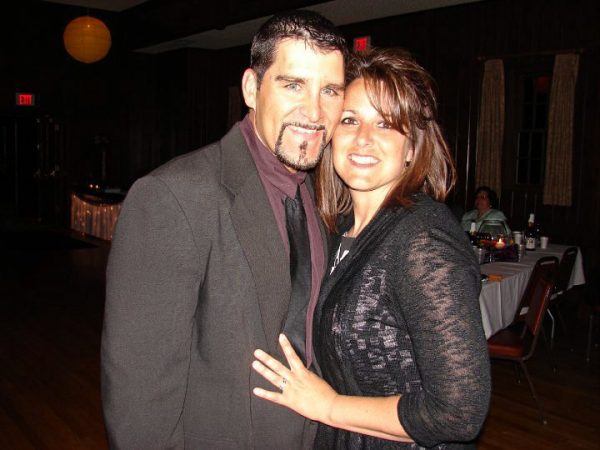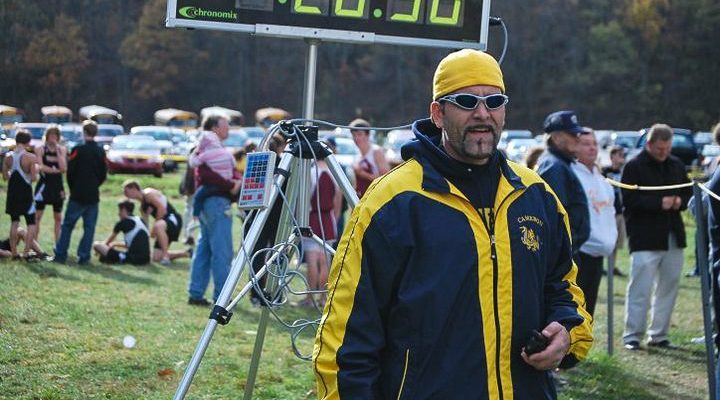He knows he does not speak for all educators and that his words do not carry the weight of 37,000 state public employees, but educator Eric James does know how he feels after nearly 20 years as a teacher and a coach in Marshall County.
And how’s that?
James feels like fighting.
But to the educator, it’s not only about the teachers and others covered under the state’s Public Employee Insurance Agency (PEIA), but also for the state’s public-school students today and in the future.
“This is not just about a raise for a lot of people who work for the state,” said James. “In terms of teachers, we have 725 vacancies around the state of West Virginia, and if you look at the pay scales in the five bordering states, you’ll start to understand why there are so many jobs open right now in our 55 counties. Each of those states has substantially higher starting salaries, and that makes a big difference to someone fresh out of college and likely saddled with a lot of student loan debt.
“In Maryland, for example, their teachers start teaching with a first-year salary of about $43,000, and here in West Virginia we are at $32,000. That’s not a lot of money in today’s economy,” he said. “We have educators in our state that have to seek public assistance because that starting salary is so low for their situation with children. To me, that’s a situation that needs corrected.”
The Mountain State ranked 48th in the country in 2017 as far as an average public educator’s compensation, and West Virginia’s first-year teacher salary, approximately $32,000 according to The National Education Association, is more than $12,000 below the national average.
As far as the state’s public employment insurance program, enrollees, James reported, have realized decrease coverage while also enduring higher premiums and deductibles.
“PEIA is an insurance company that takes care of more than 230,000 members, and that is just in this state alone. That includes the policyholders and their dependents,” James explained. “For many years, we’ve been told that the problems with the system would be fixed, and we’ve been told that PEIA would be fully funded, but, as of now, our premiums continue to increase, the deductibles continue to increase, and a couple of weeks ago we were told that the Go365 program was going to be implemented, and no one around here appreciated that.
“Go365 allows the company to track what you do on a daily basis as far FitBit results, and they make sure you are getting checkups regularly and things like that. To me, it looks like an invasion of privacy,” he continued. “Since there was such an outcry about that possibility, I understand that it’s been thrown out for now, but there’s a kicker with this whole ‘frozen’ thing by Gov. Justice, and that’s because the increases will be even higher next year when it’s thawed out.”
Along with educators, food service employees, and service personnel in public school systems in the state’s 55 counties, PEIA is available to most state workers including those working for the Division of Highways, the West Virginia State Police, the state’s correctional facilities and social workers employed by the Department of Health and Human Resources.
Late last week, Gov. Jim Justice announced he would freeze PEIA premiums for as long 17 months, a decision, he told media sources, that would cost the state as much as $29 million.
“People may think this just affects the teachers, but this affects a lot more than just us,” James said. “What I believe the reason for freezing the PEIA program as it is right now is like placing a Band-Aid over a gunshot wound, and that’s because the governor has been very, very vague about how the state will come up with the money to pay for that Band-Aid.
“I have to question how the lawmakers will come up with that money when they claim on a daily basis that they don’t have the money to do what’s really needed now,” he said. “And look at the situation with our correctional officers for the jails and prisons in the state. They’ve lost so many of those employees that the National Guard is being called in. But yet, some of those lawmakers can suggest spending millions of dollars on so many other things? How does that make sense?”

Thumbs Up, Thumbs Down
Justice has recommended a 1 percent pay increase for state employees over the next several years, and votes to increase compensation as high as 3 percent have taken place in both the Senate and in the House of Delegates. Both bills, however, were defeated, and the House approved Tuesday afternoon a 2 percent increase this year and an additional 1 percent next year.
How much would that be? James knows only his figures.
“We’re paid twice per month, so that would represent throwing me some gas money each month. Then you have to look at what’s going to happen with PEIA, and, for me, I’d be losing money because of the raised deductibles and higher premiums,” he explained. “As a taxpaying citizen of the state of West Virginia, that’s not fair, and that’s why there is a public outcry right now.
“I just don’t know how our legislators do not have the best interest of the people who are serving our state. That’s something I hope they take into consideration during the second half of this regular session because it doesn’t seem like a lot of them are right now,” James said. “A 2 percent raise, and for me, well, that would equate to about $32 more per pay.”
Officials with the West Virginia Education Association have reported the state ranked 42nd nationally in graduation rates, and 50th in the percentage of adults with bachelor degrees and advanced degrees. The state’s population topped out in 1950 with a little more than 2 million residents, but a decline of more than 200,000 citizens has been realized since.
“After reading those rankings, it really makes me wonder why we have not been funneling more money into public education, and it’s is beyond me,” he said. “And we hear everything the governor has been saying, but we’re talking about a man who switched parties, so we don’t know what to believe. Sometimes you have to wonder if he thinks before he speaks.
“And to me, this is a situation where you really have to be careful about the words you choose. It’s hard to believe he can tell the state’s public educators to calm down when all he’s doing to floating a 1 percent increases in our faces,” the teacher continued. “It’s not a good situation right now, and the governor, in my opinion, does make it worse when he says things like that. It makes teachers wonder if he has any concept about what we deal with as educators in West Virginia.”

Teach and Coach
James hopes to keep Landers, his son, close to home, and he knows the retention of young West Virginians is especially troubling to many in the state because the three-county Wheeling area is no stranger to waving goodbye to family members off to search for better opportunities.
Lander was graduated from Cameron High School last June and is currently in his freshman year at Fairmont State University.
“He’s told me that he would like to do what I do for a living. He wants to teach and coach,” James explained. “Because of his experiences at Cameron High, it’s something that he wants to pursue and pursue it close to where he was raised. So, part of the reason why I am speaking out is that I want him to have the opportunity to follow that dream and follow it here in the state of West Virginia.
“In order for our younger people to stay in the state and teach here, it’s going to take a better starting salary, and I think a good starting point would be somewhere in the $40,000 range,” he said. “It’s a more involved job than when I first started, and one of the biggest differences is the number of children that come to school from single-parent homes, so in a lot of cases you might be one of the only positive adult role models in their lives.”
James teaches both physical education, health education and weight training at Cameron High School, and he coaches football and has served as head coach of the Dragons’ baseball team, too. Since beginning his career 18 years ago, he has witnessed many new social and technological influences impacting the life situations of his students.
“When our students reach the high school level, the teachers want to not only prepare them for the classroom situations, but we also want to prepare them for the game of life,” James said. “As a teacher, you have no idea what a kid has seen or heard when they come to school, and I can tell you that at Cameron High School, we do our best as teachers to be that positive force in that child’s life.
“It’s changed drastically during my career, but a lot of the teachers tell me that it started a long time ago because of the economy and because of the increase in the number of divorces these days,” he said. “We don’t know what they are dealing with in their lives unless they tell us, and some are so distraught, they do tell us because they need help, and we’re the only ones they feel they can turn to.”
No matter whether at home or in the high school’s hallways, his students have heard the whispers and felt the buzz, and they have been asking questions about a possible walkout and the length of the current school year.
“Most of them want to know if we are going to go on strike,” James said. “They are hearing things at home or wherever because this is something most parents and the kids have been talking about. I have told them that the possibility is there. As teachers, we do have collective bargaining, and that allows us to be a part of the overall conversation, but who knows at this point if that’s going to help at all.

“We’ve seen thousands of teachers respond to this situation, and I think we’ll see even more over the next few weeks if something is not worked out,” he said. “Is the ‘S-word’ on the horizon? Right now, I’d have to say that it probably is.”
Educators in West Virginia have not initiated a strike since 1990, and the issues at that time were much the same. The work stoppage lasted 11 days because an uptick in the economy allowed for state lawmakers finally to approve small pay raises. This time around, however, a strike is likely.
At least James believes so, and if such a work stoppage is initiated, the decision would be made by the two presidents of the unions representing the state’s teacher and service personnel. Dale Lee represents the West Virginia Education Association, and Christine Campbell is with the American Teachers Association-West Virginia.
“It’s definitely a possibility; that I can tell you. It’s not what I want to see happen, but I am a member of the union, and I will stand next to my co-workers and our leadership,” he said begrudgingly. “We do have legislators in Charleston right now who are battling for us, so all we can do is hope for the best.
“But if this comes to a point to where we have to walk out, we’ll do what we have to do,” James added. “But we do want to stay in our classrooms for our students and their parents. It’s what we chose to do for a living, and it’s what we want to keep doing as long as the lawmakers can come to their senses.”
(Photos provided by Eric James)



